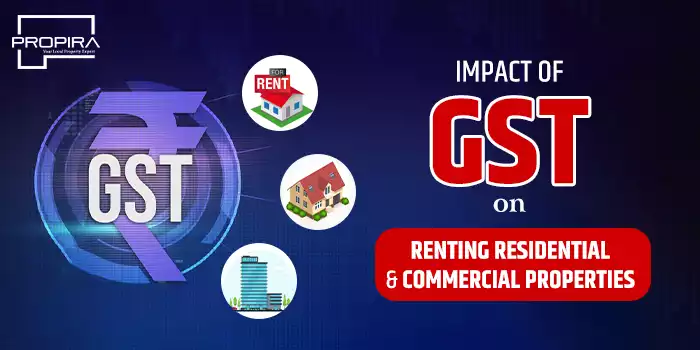
Impact of GST on Rent for Residential and Commercial Properties in India
Impact of GST on Rent for Residential and Commercial Properties in India

Overview - Tax on rental income in the pre-GST era in India
On July 18, the Goods and Services Tax (GST) was applied to rented housing for the first time. However, the GST on rent for residential and commercial will only apply in particular circumstances and in some cases. Following the suggestions made at the 47th GST Council Meeting, the government recently removed the exception on renting residential dwellings to business organizations registered with the GST.
Before introducing the Goods and Services Tax (GST), a landlord was required to register for and pay the service tax if their yearly income from their rented properties was more than Rs 10 lakh. It only applies to commercial assets and residential residences for business purposes. If the owner's annual total income from the rental units were less than Rs 10 lakh, they would not be required to pay the service tax. Before GST was implemented, a 15 percent service tax was levied on commercial buildings with rental income of more than 10 lakh rupees.
Does GST apply to rent out any property?
Rental of an Immovable Property Subject to the GST Taxable Services
Under the GST - If an immovable property is rented out, the transaction will be regarded as a provision of services following the GST law, which can be found in Schedule 2 of the CGST Act. However, the Goods and Services Tax (GST) on house rent only applies to a specific property that falls within the category of taxable services. The following are examples of them:
- Any right to occupy land, be it a tenancy, an easement, a lease, or a license.
- Renting or subleasing an immovable property (structure), such as an apartment complex, commercial or industrial facility, to conduct or facilitate business, in its entirety or in part, is considered to fall under this category.
Also read - Property rates in Sikar
The application of GST on Residential Property Rent
According to notification no. 12/2017 – Central Tax (Rate), the goods and services tax (GST) on rent of a residential property that applies to rent for residential property, is subject to the "Nil Rate." If, on the other hand, a residential property is rented out for commercial purposes, then the rental tax is subject to the same rules as the tax on rent for commercial property.
Let's imagine that Mr. A has an apartment he wishes to rent to someone else. He leases it out to a guy who operates a call center out of it, and that person uses it as an office. After that, this property is put to use in a commercial capacity.
The "nil rate" of GST on residential property rent, which is applicable for tax on rental income from residential property, will not apply to it because it is not a residential rental. The Goods and Services Tax (GST) applied to income from residential rental property here will be the same as the GST applicable to rent paid on commercial property.
A tax on the rent of commercial properties
The threshold at which businesses are excluded from paying GST on their rent has been raised to 20 lakhs from the previous point of 10 lakhs, which was applied before the implementation of GST on commercial property rent. Another ten lakhs have increased the maximum, so landlords previously required to make payments following the Service tax law can now breathe a little easier.
The Goods and Services Tax Applicable to the Leasing of Immovable Property for Business Purposes
If any immovable property is rented out for a business or commercial purpose, the landlord must pay GST on the income received from the commercial rental. When renting out a commercial property, the Goods and Services Tax (GST) rate that applies is 18% of the taxable value.
Included in the Lease Rent
If you rent a property, whether for residential or commercial use, you will be subject to GST on the rent you pay. The amount of GST you pay will depend on the reason for which you are renting the property.
The goods and services tax (GST) on rental income is applied to the monthly rent of a residential property if the rented property is used for residential purposes. No Goods and Services Tax (GST) is due on residential leases. In contrast, the Goods and Services Tax (GST) on rent will be 18% of the entire amount payable each month if the lease is for business reasons (the GST on rent paid will be added to the amount of the decided price for the lease).
When a property is rented out to business entities, who needs to register it?
Any taxpayer whose taxable income exceeds the threshold at which exemptions apply must register for GST and pay taxes. Hence, the value of the property that you have transferred to a company is subject to taxation if you have done so. You must register yourself for the Goods and Services Tax (GST) if the amount of money you make from your business, including rent and any other exempted revenue, is more than Rs. 20 lakh per year.
The limit for people who only provide services is higher than the limit for the Service Tax, which is Rs.10 lakh. The threshold limit for those who only offer services is Rs.20 lakh. Because of this, many landlords who were previously subject to the Service Tax regime can relax now that they have the potential to earn an additional ten lakh rupees.
How is GST calculated on rental properties?
The following illustration demonstrates how the Goods and Services Tax (GST) will be applied to rental payments:
- CGST will replace this GST at 9% and SGST at 9% if the landlord is registered in the same state.
- If the landlord is written in another state, the IGST at 18% will be applied.
GST applicability on renting residential property
Two variables decide whether or not the Goods and Services Tax (GST) is applicable to rent:
The type of property
Property rented out for commercial or business purposes is subject to tax on top of the rent. Even if a residential property is rented out for commercial or business activities, the rental income received and paid rent may be subject to taxation under the GST on rent regime. It is the case whether or not the property is used as a primary residence.
It is essential to point out that even if the nature of the property's usage changes, your GST liability will not be affected so long as you have rented out your property for business purposes. It holds regardless of the nature of the property's usage.
Know more about how many types of rental property
Suppose a landlord rents out his residential property to a person not registered under the GST for residential purposes. In that case, the landlord is exempt from paying GST on the income from his property rental.
Rental income minimum standard
If your service-providing business generates an annual rental income of Rs 20 lakhs or more, you must pay GST on rent under the new GST regime. Before, this threshold was set at 10 million Indian rupees. If you own a company, the annual ceiling is Rs. 40 Lakh.
GST applicability on renting of residential property from July 18, 2022, onwards.
An exemption from the Goods and Services Tax that had been previously provided for the renting of residential units has been removed by the GST Council. After the amendment, which was announced after the 42nd meeting of the GST Council on July 13, 2022, and which came into effect on July 18, 2022, GST-registered tenants will be liable to pay GST at 18%, regardless of whether the landlord is GST-registered or not, if the unit is rented for business use. It is because the amendment was announced after the 42nd meeting of the GST Council on July 13, 2022.
Only when a residential unit is rented to a commercial enterprise is the income generated by the rental subject to taxation. When rented to a private individual for that individual's personal use, no GST is charged.
On the applicability of GST on rent, the PIB tweeted, "No GST, even if proprietor or partner of firm rents residence for personal use," which was about the fact that the tax was imposed on July 18, 2022. If a proprietor is registered for GST or a partner in a firm is registered for GST and takes rented accommodation for their personal use, they will not be required to pay GST on the rent they are charged. According to a clarification provided by the Ministry of Finance in a notification published on December 30, 2022, the owner of a business company would not be required to pay GST on a residence that that individual is using in their capacity.
FAQs
What is the GST limit for rent?
The limit for people who only provide services is higher than the limit for the Service Tax, which is Rs.10 lakh. The threshold limit for those who only offer services is Rs.20 lakh.
Who has to pay GST on rent?
The individual who is responsible for paying rent must be the one to shoulder the financial responsibility of delivering the Goods and Services Tax (GST). The rent that is charged will include this GST amount.
What is the new GST rule for rental income?
If your service-providing business generates an annual rental income of Rs 20 lakhs or more, you must pay GST on rent under the new GST regime.
What is the GST limit for commercial property rent?
The goods and services tax (GST) will be imposed at an 18% rate on the taxable value of any business spaces rented out, and rent will be regarded as a taxable supply of service.
Is there GST on rent from July 18, 2022?
The result of the amendment mentioned above is that beginning on July 18, 2022, if a person provides services in the form of renting residential dwellings for use as residence to a registered person, it will be subject to GST at the rate of 18%. It will be the case regardless of whether or not the person is registered.
What are the new GST rules for rent on residential property?
No GST when rented to a private person for personal use, even if the proprietor or partner leases the dwelling for personal use. The rental of residential units is only taxable when they are rented to commercial entities.
Is a rental agreement mandatory for GST registration?
Regarding GST registration, the registration of rent agreements is an absolute requirement. Your landlord must present you with a signed, dated, and stamped rent agreement certificate bearing an authorized signature. When submitting your application to the relevant tax authorities, you are required to include this document.










Write Comment